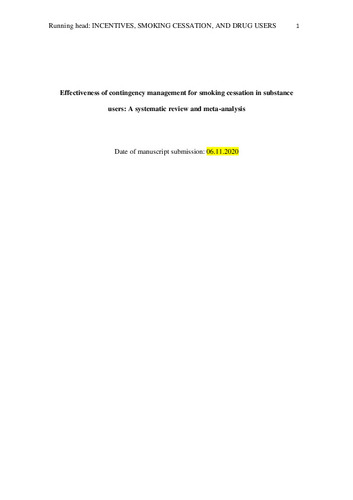Effectiveness of contingency management for smoking cessation in substance users: a systematic review and meta-analysis
Autor(es) y otros:
Palabra(s) clave:
meta-analysis
contingency management
effectiveness
smoking cessation
substance use disorder
Fecha de publicación:
Versión del editor:
Citación:
Descripción física:
Resumen:
Objective. We conducted a systematic review and meta-analysis (ID: CRD42019122315) to assess the evidence for the effectiveness of contingency management (CM) to promote smoking abstinence among individuals with substance use disorder or in recovery. Method. Databases were PubMed, PsycINFO, Cochrane, and EBSCO. The primary eligibility criteria for inclusion in our meta-analysis were as follows: any study examining the efficacy of CM for smoking cessation that reported smoking abstinence and/or cigarette reductions. The methodological quality of the included studies was assessed using the Effective Public Health Practice Project Quality assessment tool. Publication bias was examined using Egger’s regression intercept, the Begg-Mazumdar test, and Tweedie’s trim-and-fill approach. Results. A total of 22 articles were included, and 13 were included in three meta-analyses: abstinence at posttreatment (12 studies), abstinence at follow-up (8 studies), and reduction outcomes at posttreatment (6 studies). CM was superior to comparison arms in smoking abstinence (RR= 2.555; 95%CI: 1.730-3.775; p < .001) and reduction (SMD=.601; 95%CI: 0.372, 0.831; p < .001) at end-of-treatment. At long-term follow-ups, CM did not show enhanced effects over abstinence beyond those shown in comparison arms (RR=1.029; 95%CI: 0.577, 1.836; p = .922). Smoking-cessation treatment (all treatments included CM) and smoking abstinence increased the likelihood of abstinence from alcohol and/or illicit drugs. All studies were rated as being of strong or moderate quality and no marked presence of publication bias was found. Conclusions. CM for smoking cessation in individuals with substance use disorders performs significantly better than control conditions in reducing smoking at end-of-treatment.
Objective. We conducted a systematic review and meta-analysis (ID: CRD42019122315) to assess the evidence for the effectiveness of contingency management (CM) to promote smoking abstinence among individuals with substance use disorder or in recovery. Method. Databases were PubMed, PsycINFO, Cochrane, and EBSCO. The primary eligibility criteria for inclusion in our meta-analysis were as follows: any study examining the efficacy of CM for smoking cessation that reported smoking abstinence and/or cigarette reductions. The methodological quality of the included studies was assessed using the Effective Public Health Practice Project Quality assessment tool. Publication bias was examined using Egger’s regression intercept, the Begg-Mazumdar test, and Tweedie’s trim-and-fill approach. Results. A total of 22 articles were included, and 13 were included in three meta-analyses: abstinence at posttreatment (12 studies), abstinence at follow-up (8 studies), and reduction outcomes at posttreatment (6 studies). CM was superior to comparison arms in smoking abstinence (RR= 2.555; 95%CI: 1.730-3.775; p < .001) and reduction (SMD=.601; 95%CI: 0.372, 0.831; p < .001) at end-of-treatment. At long-term follow-ups, CM did not show enhanced effects over abstinence beyond those shown in comparison arms (RR=1.029; 95%CI: 0.577, 1.836; p = .922). Smoking-cessation treatment (all treatments included CM) and smoking abstinence increased the likelihood of abstinence from alcohol and/or illicit drugs. All studies were rated as being of strong or moderate quality and no marked presence of publication bias was found. Conclusions. CM for smoking cessation in individuals with substance use disorders performs significantly better than control conditions in reducing smoking at end-of-treatment.
ISSN:
DOI:
Colecciones
- Artículos [37548]
- Psicología [1482]
Ficheros en el ítem




